WGU; C200; Global Economics
Western Governors University
All 7 results
Sort by
WGU C200 Bundled Exams with Complete Solution | Verified | Everything you Need!!
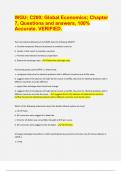
-
(Top 2024/2025 EXAM REVIEW PAPER ) WGU; C200; Global Economics; Chapter 7, Questions and answers, 100% Accurate. VERIFIED.
- Exam (elaborations) • 12 pages • 2023
-
Available in package deal
-
- $8.99
- + learn more
WGU; C200; Global Economics; Chapter 7, Questions and answers, 100% Accurate. VERIFIED. The International Monetary Fund (IMF) does the following EXCEPT: a. Provide temporary financial assistance to member countries b. Lender of last resort to member countries c. Promote international monetary cooperation d. Determine exchange rates - -Determine exchange rates Purchasing power parity (PPP) is a theory that: a. recognizes that price for identical products sold in different countries ...
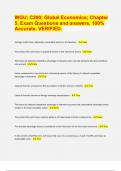
-
WGU; C200; Global Economics; Chapter 5. Exam Questions and answers, 100% Accurate. VERIFIED 2024
- Exam (elaborations) • 10 pages • 2023
- Available in package deal
-
- $12.49
- + learn more
Strategic trade theory advocates mercantilist policy for all industries. - -False The product life cycle theory is popularly known as the "diamond" theory. - -False The theory of national competitive advantage of industries does not take domestic demand conditions into account. - -False Factor endowments is one of the four interacting aspects of the theory of national competitive advantage of industries. - -True Classical theories are based on the assumption of perfect resource mobility....
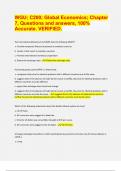
-
WGU; C200; Global Economics; Chapter 7, Questions and answers, 100% Accurate. VERIFIED 2024
- Exam (elaborations) • 12 pages • 2023
- Available in package deal
-
- $14.49
- + learn more
The International Monetary Fund (IMF) does the following EXCEPT: a. Provide temporary financial assistance to member countries b. Lender of last resort to member countries c. Promote international monetary cooperation d. Determine exchange rates - -Determine exchange rates Purchasing power parity (PPP) is a theory that: a. recognizes that price for identical products sold in different countries are all the same. b. suggests that in the absence of trade barriers (such as tariffs), the pric...
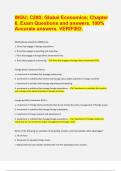
-
WGU; C200; Global Economics; Chapter 6, Exam Questions and answers, 100% Accurate answers, VERIFIED 2024
- Exam (elaborations) • 18 pages • 2023
- Available in package deal
-
- $15.49
- + learn more
Multinational enterprises (MNEs) are: a. firms that engage in foreign acquisitions. b. firms that engage in exporting and importing. c. firms that engage in foreign direct investment (FDI). d. firms that engage in outsourcing. - -firms that engage in foreign direct investment (FDI). Foreign direct investment (FDI) is: a. investment in activities that manage outsourcing. b. investment in activities that control and manage value-added activities in foreign countries. c. investment in activ...
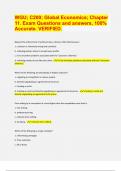
-
WGU; C200; Global Economics; Chapter 11. Exam Questions and answers, 100% Accurate. VERIFIED 2024
- Exam (elaborations) • 6 pages • 2023
- Available in package deal
-
- $8.49
- + learn more
Beyond the enforcement of antitrust laws, collusion often fails because: a. collusion is inherently wrong and unethical. b. colluding parties refuse to accept lower profits. c. it has incentive problems associated with the "prisoners' dilemma." d. colluding parties do not like each other. - -it has incentive problems associated with the "prisoners' dilemma." Which of the following are example(s) of explicit collusion? a. Signaling to competitors to reduce output. b. Directly negoti...
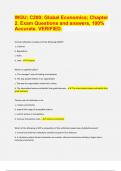
-
WGU; C200; Global Economics; Chapter 2. Exam Questions and answers, 100% Accurate. VERIFIED 2024
- Exam (elaborations) • 14 pages • 2023
- Available in package deal
-
- $15.49
- + learn more
Formal institutions include all of the following EXCEPT: a. Cultures b. Regulations c. Rules d. Laws - -Cultures What is a cognitive pillar? a. The manager's way of looking at employees b. The way people behave in an organization c. The way the organization views their culture d. The internalized values and beliefs that guide behavior - -The internalized values and beliefs that guide behavior The key role of institutions is to: a. reduce uncertainty. b. expand the range of acceptab...

Did you know that on average a seller on Stuvia earns $82 per month selling study resources? Hmm, hint, hint. Discover all about earning on Stuvia


